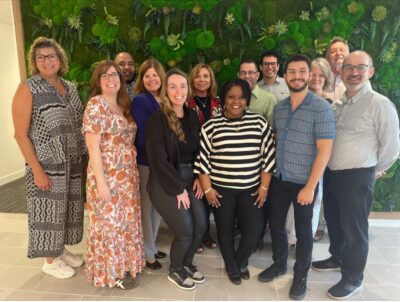Reflecting on ‘Frontline Focused: Building a Thriving and Equitable Workplace’
 Last month the National Fund hosted the Frontline Focused: Building a Thriving and Equitable Workplace in-person session to close out CareerSTAT’s recent webinar series focused on recruiting and retaining untapped talent, such as immigrants and refugees, people with conviction records, and other under-serviced populations. This intimate, two-day meeting brought together healthcare employers and workforce practitioners to explore ways to create change in their organizations.
Last month the National Fund hosted the Frontline Focused: Building a Thriving and Equitable Workplace in-person session to close out CareerSTAT’s recent webinar series focused on recruiting and retaining untapped talent, such as immigrants and refugees, people with conviction records, and other under-serviced populations. This intimate, two-day meeting brought together healthcare employers and workforce practitioners to explore ways to create change in their organizations.
Attendees were enthusiastic to get to work and were eager to learn, share, and connect with their peers. The energy in the room was that of hope, respect, and a commitment to develop a truly thriving workforce for healthcare workers.
The agenda focused on creating space for folks to consider how to begin meaningfully enacting practice changes to create more equitable workplaces. Intentionally focusing time for strategic thinking and planning resulted in rich conversations, a deeper exploration of tools, and meaningful peer-to-peer connections. Sharing this space together in-person created a renewed pathway of understanding that isn’t always the case in virtual formats.
The biggest takeaways from these very productive two days are:
- People rarely have the time and space to step back and think broadly about their work without other priorities getting in the way. With plenty of time carved out for activities, conversations, and thinking, this meeting was a hotspot for critical ideation and “big thinking”. Challenges and opportunities are often two sides of the same coin. For example, lacking resources, like money and capacity, is a barrier that many organizations face when making equitable practice changes. However, there are more opportunities for funding, technical assistance, and partnerships to specifically address those challenges.
- Many barriers faced by workers and employers are systemic and require commitment, cooperation, and advocacy from leadership to change. Several participants had an a-ha moment when hearing the term social determinants of work. Because many healthcare leaders are familiar with social determinants of health, this is an effective phrase to communicate how a similar concept can be applied to the workforce.
- Systems change is hard! But, it’s much more manageable when efforts to shift employer mindsets and practices are broken up into smaller, easier to manage chunks. The Toolbox for the Systems Change Mindset does just that to help leaders tackle complex problems!
- Although not a new idea, there was an emphasis on how good relationships and thoughtfully designed jobs positively affect workers and business outcomes. Explore this evidenced-based connection further in the Job Quality Outcome Maps.
Itching to join the conversation? Never fear, the Healthcare Employer Community of Practice is here! This is the place to connect with peers, share resources, and keep the momentum going.





